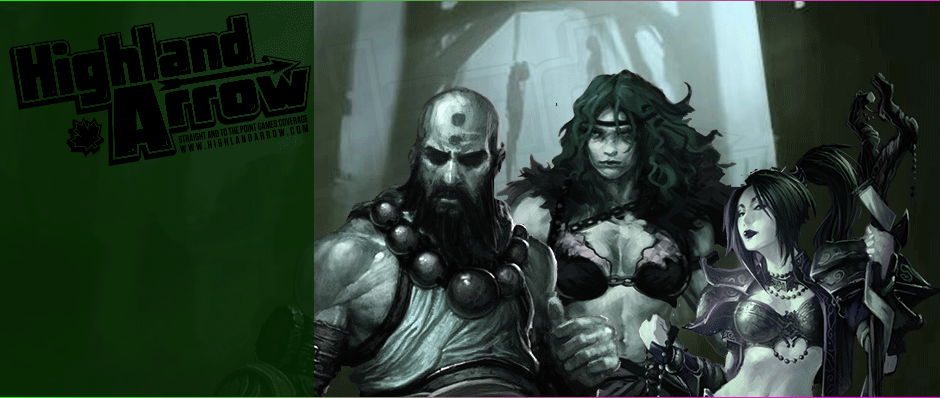

Diablo III
Platforms: PC, PS3, PS4, X360, XONE
Reviewed on: PC
Reviewer: Maiyannah Bishop
Developer: Activision Blizzard
Publisher: Activision Blizzard
Released: 2012-05-15
Review Published: 2014-08-13
Review Updated: 2020-04-22
+ Good if repetitive core mechanics
+ Variety of skill interactions within and between
classes
+ Strong audiovisual style
+ Impressive cinematics
- Story doesn't focus on the protagonist
- High level of grind and reptitive play
- Boss fights seem trivially easy compared to past
installments in the series
- Always online DRM, even in single-player, is fraught
with problems

Diablo III is a rogue-lite action RPG developed and published by Activision Blizzard. It is the third game in the genre-setting action hack and slash series (fifth if you include expansions, although Hellfire was not developed by Blizzard themselves) and it has a lot to live up to when it comes to the anme of the series. Does it? Well, yes, for the most part, though it's not perfect.

Like most Blizzard games,
Diablo III's presentation is top-notch
Blizzard has always had a spectacular art direction in its games, and Diablo III is no exception: with great background art and particularly stunning cinematics. The character art has a certain low-poly "World of Warcraft" look that manages to mostly look great despite that, and is pretty permissible given how many characters can end up on the screen at any given time, given that Diablo III loves to drown you in fodder enemies. For the most part it looks, sounds, and feels pretty good.
The one complaint I have with the presentation is the emphasis on flashy particle effects that the game has when it comes to certain skills - in particular the poison abilities of the Witch Doctor and many of the Wizard's spells - often can leave the game screen cluttered with effects that make it difficult to tell what's going on and see enemies. It's also not always readily evident when an enemy is dead or not.
The narrative is flashy and well-presented,
but leaves the player behind.
One of the things that I didn't like about Diablo II as a sequel was the change of the narrative tone and focus. It changed Diablo from a gothic horror sort of game into a more traditional and mainstream action fantasy. I don't have any particular problem with action fantasy obviously,. it's one of my favourite genres, but the sort of gothic horror vibe the original had going as opposed to Diablo 2 and 3's more traditional action fantasy was a little more unique and quite well done. It was very deeply thematic and helped to separate the universe of Diablo from the studio's other popular fantasy setting, Warcraft and it's various realms contained therein. This created a sort of seperation of tone as well of physical setting that helped differentiate the two.
The biggest problem I had with the shift in the method of story-telling between Diablo 1 and it's predecessors. Whereas the focus in 1 was solidly on the player character and that protagonist's progression and actions, the stories of Diablo III, and to a lesser degree Diablo 2, is that the story is told through the actions of the people around the protagonist. You end up feeling like a secondary character in the game you are playing, and errand boy or girl for the important folk too vital to be bothered with the nitty gritty of the affair. Diablo III has some especially bad moments of this, where you are literally just watching the story progress not only without any agency to change it, but with a feeling where literally, your presence is not important. In trying to up the stakes with epic sieges and larger battles, they take that feeling of power from you. In one segment you feel like just another soldier fighting in a pitched battle, whose life or death seems meaningless in the scale of the larger battle. You don't feel like your actions are important, or at least, I sure didn't, and that does a lot to take the teeth out of the feeling of high stakes and tension that the sequence is trying to create. The story itself is fine, but how it communicates seems, quite frankly, sub-par.

The core mechanics offer some depth,
but they're still pretty repetitive.
So Diablo III itself is clicking. A lot of clicking. It breaks up that clicking of the mouse with the occasional click of my mechanical keyboard's 1, 2, 3, or 4 button being pressed, but at it's core, Diablo III is a game about clicking, and indeed it involves a lot of clicking. This actually isn't foreign to rogue-like and rogue-lite games, and the Diablo series is arguably one of the games that helped revive that genre, or much more accurately, more likely, bring it to more mainstream attention. So it's not something I necessarily begrudge Diablo III, but it's something that it might be hard to get away from for some people.
Diablo III acquits itself to some degree by offering two different levels of some complexity to that central combat: first of all there are a variety of skills, and with each of those skills you have to decide which ones to take, offering a variety of choice and tweaking to be done, and secondly, there is a careful attention paid to how the skills of different classes interplay together, offering even more depth to the game in cooperative multiplayer. Each of the classes takes an effective role in multiplayer, and there is a great variety of ways you can use those skills together. Each of the individual skills you have falls under 6 umbrella 'slots', and each slot has a variety of skills you can bind to it, soe even within a class there is a great latitude of different builds you can come up with, each which will play a little differently. It keeps the otherwise repetitive gameplay at least varied as you progress.

Always-on requirement even for the single-player
is to the great detriment of the game
So while the game in general could be called a well-produced rogue-like or hack-and-slash RPG with great cinematics and a strange story focus, there's one big bugbear that keeps me from recommending Diablo III in a less qualified manner, and that's the inclusion of always-online DRM. The game requires a constant connection to Battle.net even when you are playing single-player games. If you lose that connection at any time, you will not be able to play, and if you lose that connection mid-game, you will lose your progress. There is no proper save button; indeed, your characters and their progress are in fact not saved on your computer but on the Battle.net servers. No doubt this could be attributed to providing anti-cheat measures, but quite frankly, this makes sense for multiplayer, where duping and other exploitative cheats have been a problem for Diablo as a series for years, as well as in World of Warcraft to a lesser degree, if someone wants to cheat in a strictly single-player game then what's the harm done? There is not harm in that, save to that person's personal enjoyment of a game. And if someone wants to make a game easier or harder for themselves, then that's a decision they make.
Let's call this what this truly is: it's DRM. It exists solely to prevent piracy of the game, and the requirement of the game to always be online, even in single-player games, is something done to protect the developer. Our uninterrupted enjoyment of the game is the collateral damage that Blizzard is evidently willing to accept in the name of making a few more dollars. It's reprehensible, and moreover, it's technically-flawed, with my play-through of the game taking almost half over as long as it should have due to the constant need to "reconnect" or otherwise restart my single-player game. And this is on a 45/5 connection with minimal packet loss. I can only imagine how bad it must be in parts of the country with subpar connections. This is compounded by that checkpoint and cloud save method, where we are constantly reset back to that checkpoint if our connection is flagging, and we have no control over when we save to save more often. It's aggravating, poorly-designed, and unacceptable. This is exactly the kind of thing that Ubisoft got all but crucified for with the Assassin's Creed DRM, so it's curious to see that Blizzard didn't face a similar backlash. They rightly should have.


